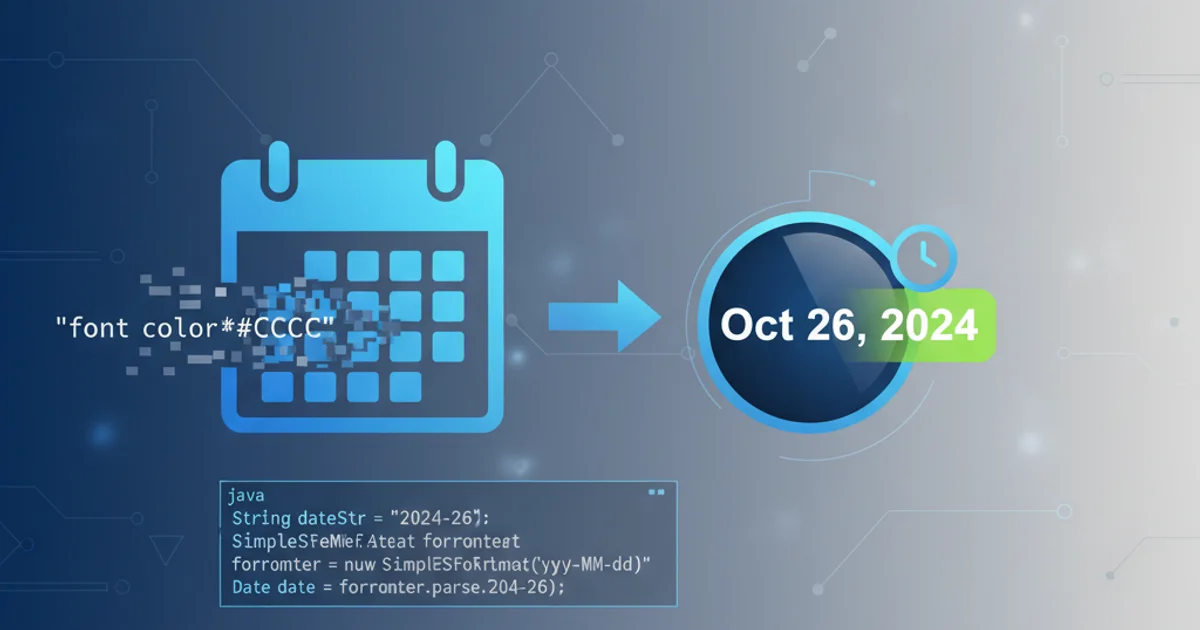Java string to date conversion
Categories:
Mastering Java String to Date Conversion

Learn the essential techniques for converting string representations of dates into Java Date and LocalDate objects, handling various formats and potential pitfalls.
Converting a String to a Date or LocalDate object is a common task in Java development. Whether you're parsing user input, reading data from a file, or consuming an API, understanding how to correctly handle date strings is crucial. This article will guide you through the modern Java Date and Time API (java.time) and the legacy java.util.Date approach, demonstrating best practices and common solutions.
The Modern Approach: java.time Package
Introduced in Java 8, the java.time package (also known as JSR-310) provides a comprehensive and immutable API for handling dates and times. It addresses many of the shortcomings of the older java.util.Date and java.util.Calendar classes, offering better clarity, thread-safety, and functionality. For converting strings, LocalDate, LocalDateTime, and ZonedDateTime are commonly used, paired with DateTimeFormatter.
flowchart TD
A[Input String Date] --> B{Define Pattern: DateTimeFormatter}
B --> C{Parse String: LocalDate.parse() or LocalDateTime.parse()}
C --> D[Date/Time Object]Process for converting a string to a date/time object using java.time.
import java.time.LocalDate;
import java.time.format.DateTimeFormatter;
import java.time.format.DateTimeParseException;
public class ModernDateConversion {
public static void main(String[] args) {
String dateString1 = "2023-10-26";
String dateString2 = "26/10/2023";
String dateString3 = "October 26, 2023";
// Pattern 1: ISO_LOCAL_DATE (yyyy-MM-dd)
DateTimeFormatter formatter1 = DateTimeFormatter.ISO_LOCAL_DATE;
try {
LocalDate date1 = LocalDate.parse(dateString1, formatter1);
System.out.println("Parsed date 1: " + date1); // Output: 2023-10-26
} catch (DateTimeParseException e) {
System.err.println("Error parsing date 1: " + e.getMessage());
}
// Pattern 2: Custom format (dd/MM/yyyy)
DateTimeFormatter formatter2 = DateTimeFormatter.ofPattern("dd/MM/yyyy");
try {
LocalDate date2 = LocalDate.parse(dateString2, formatter2);
System.out.println("Parsed date 2: " + date2); // Output: 2023-10-26
} catch (DateTimeParseException e) {
System.err.println("Error parsing date 2: " + e.getMessage());
}
// Pattern 3: Custom format with full month name (MMMM dd, yyyy)
DateTimeFormatter formatter3 = DateTimeFormatter.ofPattern("MMMM dd, yyyy");
try {
LocalDate date3 = LocalDate.parse(dateString3, formatter3);
System.out.println("Parsed date 3: " + date3); // Output: 2023-10-26
} catch (DateTimeParseException e) {
System.err.println("Error parsing date 3: " + e.getMessage());
}
// Handling LocalDateTime
String dateTimeString = "2023-10-26 14:30:00";
DateTimeFormatter dateTimeFormatter = DateTimeFormatter.ofPattern("yyyy-MM-dd HH:mm:ss");
try {
java.time.LocalDateTime dateTime = java.time.LocalDateTime.parse(dateTimeString, dateTimeFormatter);
System.out.println("Parsed datetime: " + dateTime); // Output: 2023-10-26T14:30:00
} catch (DateTimeParseException e) {
System.err.println("Error parsing datetime: " + e.getMessage());
}
}
}
Examples of converting various date string formats to LocalDate and LocalDateTime using DateTimeFormatter.
DateTimeFormatter.ofPattern() for custom date formats. Be precise with your pattern characters (e.g., MM for month number, MMM for short month name, MMMM for full month name, HH for 24-hour, hh for 12-hour).The Legacy Approach: java.util.Date and SimpleDateFormat
Before Java 8, java.util.Date and java.text.SimpleDateFormat were the primary classes for handling dates and their string conversions. While still widely used in older codebases, SimpleDateFormat has several known issues, most notably being not thread-safe. This means that using a single instance across multiple threads can lead to incorrect results or exceptions. If you must work with legacy code, be aware of these limitations.
import java.text.ParseException;
import java.text.SimpleDateFormat;
import java.util.Date;
public class LegacyDateConversion {
public static void main(String[] args) {
String dateString1 = "2023-10-26";
String dateString2 = "26/10/2023 15:45:00";
// Pattern 1: yyyy-MM-dd
SimpleDateFormat formatter1 = new SimpleDateFormat("yyyy-MM-dd");
try {
Date date1 = formatter1.parse(dateString1);
System.out.println("Parsed date 1: " + date1); // Output: Thu Oct 26 00:00:00 UTC 2023 (or local timezone)
} catch (ParseException e) {
System.err.println("Error parsing date 1: " + e.getMessage());
}
// Pattern 2: dd/MM/yyyy HH:mm:ss
SimpleDateFormat formatter2 = new SimpleDateFormat("dd/MM/yyyy HH:mm:ss");
try {
Date date2 = formatter2.parse(dateString2);
System.out.println("Parsed date 2: " + date2); // Output: Thu Oct 26 15:45:00 UTC 2023 (or local timezone)
} catch (ParseException e) {
System.err.println("Error parsing date 2: " + e.getMessage());
}
}
}
Examples of converting date strings to java.util.Date using SimpleDateFormat.
SimpleDateFormat is not thread-safe. If used in a multi-threaded environment, create a new instance for each conversion or use a ThreadLocal to manage instances. For new code, always prefer java.time.Handling Time Zones and Locales
When dealing with dates and times, especially in global applications, time zones and locales become critical. The java.time API provides robust support for these. ZonedDateTime is used for date-time with a time zone, and DateTimeFormatter can be configured with a Locale to handle language-specific date formats (e.g., month names).
import java.time.ZonedDateTime;
import java.time.ZoneId;
import java.time.format.DateTimeFormatter;
import java.time.format.DateTimeParseException;
import java.util.Locale;
public class TimeZoneAndLocaleConversion {
public static void main(String[] args) {
String dateTimeString = "2023-10-26 10:00:00 AM PST";
String localizedDateString = "26. Oktober 2023";
// Parsing with Time Zone
DateTimeFormatter formatterWithZone = DateTimeFormatter.ofPattern("yyyy-MM-dd hh:mm:ss a z");
try {
// Note: For 'PST', 'EST', etc., you might need to map them to proper ZoneId like "America/Los_Angeles"
// For simplicity, let's assume a standard format with offset or full zone name.
// A more robust solution for 'PST' would involve a custom resolver or ZoneId.of("America/Los_Angeles")
// Let's use a more standard format for direct parsing with ZoneId
String dateTimeStringWithOffset = "2023-10-26 10:00:00-0800";
DateTimeFormatter offsetFormatter = DateTimeFormatter.ofPattern("yyyy-MM-dd HH:mm:ssZ");
ZonedDateTime zonedDateTime = ZonedDateTime.parse(dateTimeStringWithOffset, offsetFormatter);
System.out.println("Parsed ZonedDateTime: " + zonedDateTime);
System.out.println("Converted to UTC: " + zonedDateTime.withZoneSameInstant(ZoneId.of("UTC")));
} catch (DateTimeParseException e) {
System.err.println("Error parsing ZonedDateTime: " + e.getMessage());
}
// Parsing with Locale
DateTimeFormatter germanFormatter = DateTimeFormatter.ofPattern("dd. MMMM yyyy", Locale.GERMAN);
try {
LocalDate germanDate = LocalDate.parse(localizedDateString, germanFormatter);
System.out.println("Parsed German date: " + germanDate);
} catch (DateTimeParseException e) {
System.err.println("Error parsing German date: " + e.getMessage());
}
}
}
Demonstrates parsing date-time strings with time zone information and locale-specific formats.